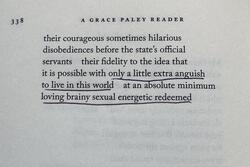The modern Haggadah: New voices and the reactionary
The Wandering is Over Haggadah: Including women's voices. Presented by the Jewish Women's Archive and JewishBoston.com.
This year I tried something new at my family’s Seder. We used a new Haggadah! After researching various Haggadot, I picked: The Wandering is Over Haggadah: Including Women’s Voices, created by www.Jewishboston.com, and the Jewish Women’s Archive in Brookline, MA. These two organizations represent my liberal Jewish values, and the voices of various Jews, including Jewish women. I thought talking about women’s rights’ as part of our annual reflection on liberation would be a good first choice for my family due to the many strong women and emphasis on education our family has.
While I did not expect it to be a smooth transition, I was shocked by the backlash I received. The argument against a newly introduced Haggadah was that I had re-written Jewish history, and that Judaism is about tradition, the story of the past, and not the current political struggles we face. It caused me to question how we successfully enact change. If things are to remain stagnant in our history and we are simply to retell the past what purpose does that serve? What are we learning, discussing, and how are we using our history to create change? I recognize that change is slow, but to me learning about our Jewish past ensures that we as Jews have empathy for others current need for liberation.
One of the most common phrases repeated in torah is “For you were strangers in the land of Egypt.” We learn as Jews not to oppress the stranger. That phrase from the Torah is Jewish tradition, and a value that we are told to pass on, it is a piece of our history. Do we recognize the strangers in our current society? Are we able to understand their need for liberation and how we as Jews can ensure that they are not oppressed since we faced a similar fate in Egypt?
I learned that storytelling is only a powerful tool if we are highlighting all our voices. This new Haggadah never once changed the rituals, and history of the story that my family was used to, instead it added the narrative of women in both biblical times and liberation that is more recent. Aren’t the stories of the women who were present also needed to get the full picture of our Jewish history? Just because past Haggadot may have been written in a different time, where men dictated the story, does not mean we still live in that world today. As we make ripples towards change, we need to make sure our goals for equity are synonymous with our actions.
We have the ability to highlight voices that were a part of the Passover story such as Shifra, Puah, and Miriam who saved Jewish babies from being killed in the Nile. Their actions helped lead the Jews towards liberation! I refuse to stand by hearing the history of my ancestors and learn nothing from it except a heart-warming story of our freedom. The story in the Haggadah teaches me to fight for others’ liberation and justice. It teaches me to discuss reforming policies in our country and to help the stranger around the world. I struggle with how to create change with the reactionary’s aversion to new ideas.
If you did one thing this year at your Seder, I hope it was prompting discussion on current needs for liberation. Change happens slowly but when we tell our story of liberation we do so to challenge ourselves and others, to remember our own liberation, and why it is important to feel as if we were personally slaves in Egypt. By remembering our enslavement, we “recall” what history has taught us, and what it feels like to be the other. When we tell the story of liberation, we strengthen our need to not stand idly by in others’ struggles towards freedom.
This was originally posted on Tackling Torah. Reposted with permission.






